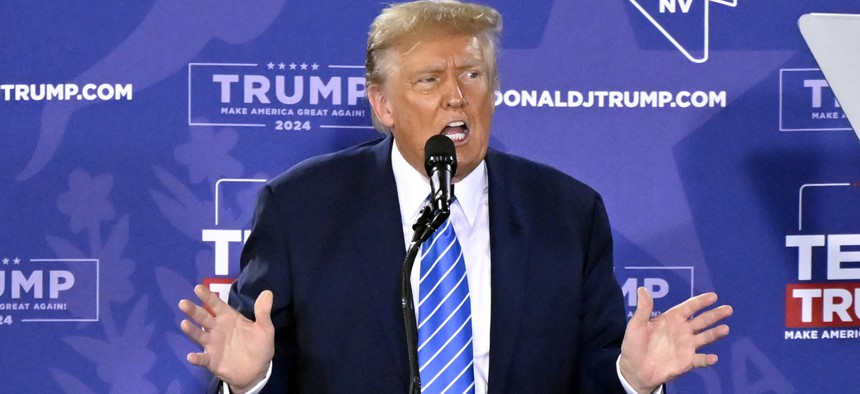Donald Trump
NY Board of Elections votes to keep Trump on the primary ballot
The state board rejected arguments that the former president should be kept off the ballot because he participated in an insurrection.

Former President Donald Trump should be on New York’s primary ballot, the state Board of Elections said Tuesday. David Becker/Getty Images
The New York Board of Elections voted Tuesday to keep Donald Trump on the state’s Republican primary ballot. The decision went against arguments that Trump should be kept off under the 14th Amendment’s disqualification clause, which says no one should hold office if they've engaged in insurrection or rebellion against the United States.
While the Republican BOE commissioners acknowledged they’d received correspondence requesting Trump be kept off the ballot, they said they based their decision on state ballot eligibility rules pertaining to candidates’ campaign finances and their national prominence. The board has a total of four members, but the two Republicans, Peter Kosinski and Anthony Casale, maintain authority over Republican candidate eligibility for the primary ballot. A formal objection is in the works, according to state Sen. Brad Hoylman-Sigal.
“The commissioners and the staff have all reviewed each and every piece of correspondence received. While we understand the opinions shared in these letters, the matter before this board is confined to the law for ballot access in New York state,” Casale said.
The decision came after two federal court challenges arose over Trump’s eligibility in New York. A federal judge in Albany dismissed one of those cases upon the request of the voter who originally filed it, but the other is still pending in New York City.
And lawmakers had separately urged the Board of Elections to act. State Sens. Hoylman-Sigal, Liz Krueger, Gustavo Rivera, Tim Kennedy and Shelley Mayer sent a letter to the Board of Elections pushing for the former president’s removal in December, arguing that Trump is responsible for the Jan. 6 attack on the U.S. Capitol and thus ineligible to again run for president. A majority of the New York City Council echoed the request last month. The move is not without precedent – Maine and Colorado have both disqualified Trump from their presidential primary ballots. Other states are currently engaged in similar efforts.
Trump has already challenged the decisions in Maine and Colorado, and the U.S. Supreme Court is set to hear arguments regarding his removal in Colorado on Thursday. A ruling in that case would determine whether the former president can appear on primary ballots across the nation and would impact New York as well.
Any formal objection to the board’s decision would need to be filed within the next three days, according to Jerry Goldfeder, election and campaign finance lawyer. The commissioners’ decision can also still be challenged in state court if filed in the next couple of days, although it is likely that the court would want to wait at this point for the U.S. Supreme Court’s ruling in Colorado, according to election attorney Sarah Steiner.
“The formal objection process under NY Election Law now begins. And if the State Board doesn’t rule Trump off the ballot, objectors will ask the NY courts to do so,” Goldfeder said.
Hoylman-Sigal said Council Member Shekar Krishnan and a Republican voter from Rochester will file an objection with the board. If the board overturns that, they’ll then file a petition in state court.
“We’re going to court,” Hoylman-Sigal said.
This is a developing story that will be updated.
Rebecca C. Lewis contributed reporting.
NEXT STORY: Joint fundraising committees are funneling huge amounts of money into NY House races

